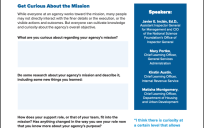 We all know people who never seem to fail. On the other hand, we also know those who take failure so personally that they get stalled. We all want to feel successful, and many of us work hard to do so, but the results of our efforts do not always make us happy. A direct gaze and firm handshake are no longer all it takes to keep your career track fluid. Whether you are in management or on the front line, consider nurturing the three personal arts of acceptance, listening and detachment to develop your emotional intelligence. You may even find that what it takes to building a fulfilling career is no different from what it takes to get the best out of life.
We all know people who never seem to fail. On the other hand, we also know those who take failure so personally that they get stalled. We all want to feel successful, and many of us work hard to do so, but the results of our efforts do not always make us happy. A direct gaze and firm handshake are no longer all it takes to keep your career track fluid. Whether you are in management or on the front line, consider nurturing the three personal arts of acceptance, listening and detachment to develop your emotional intelligence. You may even find that what it takes to building a fulfilling career is no different from what it takes to get the best out of life.
How is it that one employee seems to glide past rough spots as others wince through turbulent times? Or, one manager forms strong alliances in an area where previous attempts have failed? Is it luck? Perhaps, but maintaining consistent forward momentum regardless of inevitable setbacks takes focus.
Personal Art #1: Acceptance
Acceptance means taking in the whole without judging the package. If the receptionist at your bureau complains to you about people screaming at her, it is your place to ask her about the nature of the complaints. It is not your place to assume that she doesn’t like her job. Whether she likes her job or not is immaterial. Go past the symptoms of her annoyance. Create a system that allows her to capture and forward each event to someone to own the issues. If you are not a manager and you’re dealing with an angry customer, know that this has nothing to do with you. Allow the vent. Your first mission is to empathize so that the customer feels heard. Then, take ownership by forwarding the complaint for further action.
Personal Art #2: Listening
Listening is a big challenge for many of us (the author included). It takes self-control to be still and take in as much information as possible before speaking. That is because we all want to be heard. But, if you are in a position to exert change or you have people reporting to you, it is not your time to be heard. It is your time to listen and learn so that you can make good choices. Many of us have a tendency to “think out loud,” but unless you are asked for an opinion during a discussion, your only job is to listen. When you do speak, it will become a part of the record in the mind of the person you are speaking to. So make sure that you have all the details you need before opening your mouth.
Personal Art #3: Detachment
Detachment, in this case, is not what it sounds like. It does not mean that you just don’t care. It means that you do not allow day-to-day processes to enmesh you and define your worth as a person. For example, say you have worked on a task for a long time and feedback indicates that it needs modifications, don’t dig in your heels and become defensive. After all, the work is reflective of the whole and not just you. Or, if you did not get the promotion or raise you were hoping for, don’t be discouraged. Instead, let it guide you towards examining your own actions and options. In this case, detachment is not so much removing yourself as it is freeing yourself, as practiced in Buddhism.
Emotional intelligence is not just for leaders
Emotional intelligence (sometimes called “emotional quotient” or “EQ”) is the ability to monitor and moderate one’s emotional state while maneuvering diverse interactions and circumstances. This is not something you are either born with or not, like a talent. Everyone uses EQ to a degree, with varying outcomes. Anyone can refine their own emotional intelligence. It takes practice and the decision that this is important to you. While you may do this for career purposes, you will find that it benefits you in your personal life as well. The personal arts mentioned above are actually excellent building blocks for better emotional intelligence.
Many employees err by assuming that only management and executive staff need to strive for greater emotional intelligence. Actually, fine-tuning emotional intelligence is for everyone. It will help you to enjoy work and deftly leave workaday cares behind during your off hours. Another side benefit is that others will seek you out for leadership positions because of the harmony that trails in your wake. People are always watching you, and there may be a door opened that you didn’t even know was there, thanks to someone noticing your value to the team.
The main takeaway here is that when you create ways of living that bring balance to your own life, you automatically become a greater asset everywhere else. With family and friends, at work, as part of a community project or team, you will always shine. So, become a master of the personal arts of acceptance, listening and detachment to reap the rewards of superior emotional intelligence.
Anita Davis is part of the GovLoop Featured Contributor program, where we feature articles by government voices from all across the country (and world!). To see more Featured Contributor posts, click here.





It’s interesting to think of these things (some of us) do everyday as a “personal art.” I love the perspective!
Thanks so much Kaitlin! I thought I might give a couple of building blocks for EQ since developing it may seem insurmountable to some people. They may say to themselves, “I don’t have it in me” or “I’m not that type” – but really, I think we all have this potential.